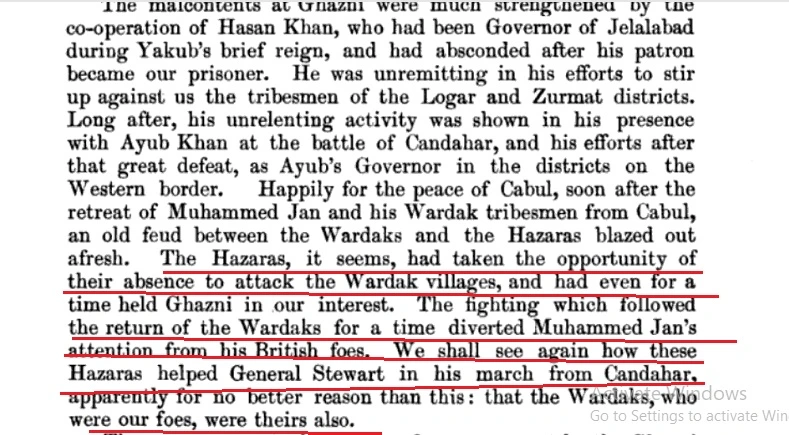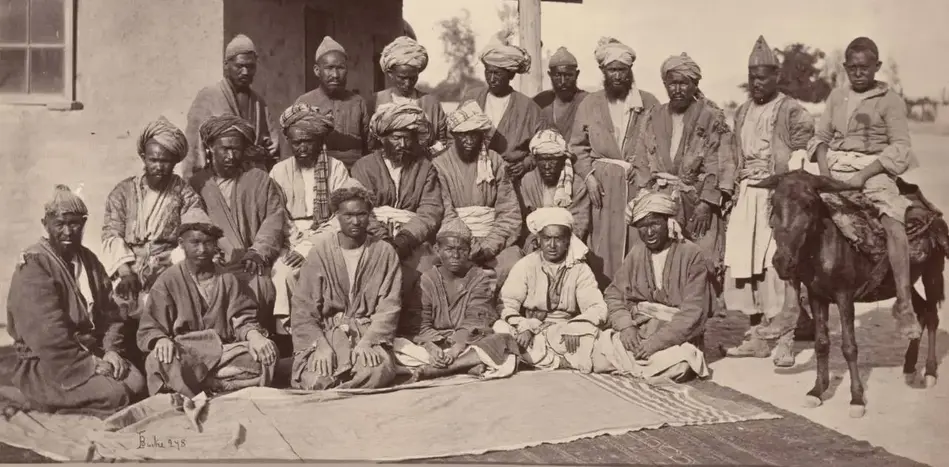Hazaras, like other Shias of Afghanistan, welcomed the British invaders during the First Anglo-Afghan war in their sectarian hatred for Sunni Pashtuns. There did not appear to be repercussions for them for collaborating with British invaders in the First Anglo-Afghan war. However, in Second Anglo-Afghan war, their enmity with Pashtuns turned very dark and ugly. They had much widescale collaboration with British invaders during the Second Anglo-Afghan war. They appeared to be assured that British had come to permanently occupy Afghanistan so they attacked Pashtun villages (whose men were busy fighting elsewhere against the British invaders), with no hesitation. However British, yet again, retreated from Afghanistan, and Hazaras had to face the immediate and last-lasting consequences for the massacre of Pashtuns and for a widescale collaboration with British invaders in the war.
The following excerpt from the account of Sir Donald Stewart’s march from Kandahar to Kabul in 1880 was written at the time and sent home for publication by an eyewitness of the above-mentioned vile acts committed by Hazaras. (Published in Macmillan’s Magazine, Volume 44, 1881)
“It was at Karabagh, 190 miles north of Kandahar, that General Stewart first received trustworthy intelligence of the numbers and constitution of the hostile gathering on our right, and of their avowed intention to fight at all hazards. At this time, however, the enemy were out of sight among the hills, being driven to a greater distance than before by the crowds of their deadly enemies the Hazaras, who, at the first sign of the approach of the English troops, swarmed down in thousands from the lofty mountains to the West. A great deal had been written and said about the advantages we should reap directly we got into the Hazara country; all difficulties about getting supplies and intelligence were at once to disappear; the Hazara tribes were in short to prove themselves most efficient and useful allies. Suffice it to say that so far from this being the case, from the moment that the first Hazara chiefs came into our camp at Karabagh, to the date on which at Ghazni the General finally dismissed in Durbar the very large gathering of chiefs that had by that time assembled, the presence of these men was to all concerned not only an immense and unmitigated nuisance, but a positive obstruction to our movements; while their conduct in looting and burning Afghan villages, and in slaying every Afghan man, woman, and child whom they met with on the road—as long as our presence secured them against retaliation—brought upon us the odium and responsibility of acts which we exerted ourselves to the utmost to prevent.
No words can convey an idea of the extent to which the feud between the Karabagh Afghans and their Hazara neighbours had been pushed. Neither age nor sex had been spared; children had been butchered, women foully dishonoured, and the graves of the dead everywhere desecrated. It seems hopeless to expect that the two tribes can ever again exist as heretofore in neighbourly juxtaposition one to another. The only satisfaction was that the most careful inquiry made on the spot elicited the fact that the Karabagh massacres could in no way, however remote, be ascribed to the presence of the British in Afghanistan. Nearer Ghazni the bitterly hostile feeling that existed between Afghan and Hazara, took its rise, no doubt, in the refusal of the latter to join in the war against the British, and the fighting engendered thereby was certainly embittered by the course of events in Karabagh. But the Karabagh massacres were mainly and primarily due to an attack made by the Hazara Malik of the Char-Dasteh tribe upon a defenceless village which had been purchased from him by a Kharoti Afghan several years before. The Afghans had lived for years at peace with their Hazara neighbours. Faiz Mahomed, the Hazara chief, thinking, however, that the disturbed state of affairs at Kabul afforded him a good opportunity of recovering gratis the property he had sold, planned an attack upon the Afghan village, and in the dead of night killed every man and child in it, distributing the women among his own followers. It cannot be wondered at that the thirst for vengeance on the part of the Afghans was deep, and not easily appeased; and the atrocities since committed by them upon the general body of Hazaras, without reference to their tribes, has of course intensified the deadly enmity between the two sections.
The army arrived in Karabagh on the 16th of April, and halted there one day, as a rest was much needed by men and animals, and it was necessary to recruit the supplies. One Hindu merchant alone had remained in the district and had collected a large quantity of grain and flour, for which he received liberal payment. The army could, however, have obtained ample supplies here for days by its own agency, had it not been for our so-called allies, the Hazaras. The pitching of our tents was, however, the signal for these men to come down in thousands from the mountains. They looted supplies that would have otherwise come to us, and day and night the horizon was aflame with the blaze of the villages which they had set on fire.1 Their chiefs seemed to have no power over them, and their own answer to remonstrances was that as they had already suffered much, and were certain to suffer still worse, at the hands of the Afghans, they were bound to inflict all the injury possible upon their enemies while the opportunity offered. On the arrival of the English in Karabagh one of our foraging parties found 400 Hazaras squatting, fully armed, round a fort in which twenty-five Afghans had shut themselves up. These latter had intended to bolt on our approach -with the rest of their compatriots, but had been surrounded by the Hazaras before they could get away, and when our party arrived they were found looking uncomfortably over the walls of their village at what must have seemed to them very like certain death. The Hazaras were quietly waiting until the gates should be opened to bring out provisions for us, when they intended to rush in and indulge themselves with a general massacre. It was with great difficulty that they were induced to retire and forego their bloodshed and booty, and indeed they did not budge until the Political Officer arrived and intimated to them very plainly that it would go hard with them if they attempted to attack the besieged Afghans. They then retired slowly and reluctantly, and their intended victims escaped during the night. By dawn the Hazaras had returned and burned the fort. On another occasion our advanced cavalry scouts surprised in a village two Afghan women who had come back to search for a child lost in the general exodus of the previous day. The Hazaras swore that these were women of their own tribe, intending doubtless to cut their throats; and it was piteous to see the terror of these poor creatures when they were taken before the Political Officer to have their fate decided. They were soon made happy, however, and being placed on a couple of donkeys were taken to our advanced picquets and told to make the best of their way to the enemy’s outlying picquets, clearly visible at about two miles distance; the excellent time which they and the donkeys mutually made across the intervening distance was refreshing to witness. This was the day before the action at Ahmed Khel.
(On the return march of Sir F. Roberts force to Kandahar in August of the same year the condition of affairs was entirely reversed. It was then the Afghans who were in the ascendant in Karabagh, and the Hazaras were everywhere deserting their villages and property and fleeing for their lives.)
Attack on Wardak villages
During 2nd Anglo-Afghan War, when Wardak (Pashtun) men were busy fighting against British invaders elsewhere, the neighboring Hazaras took advantage of their absence and attacked the Wardak villages. This diverted Ghazi Muhammad Jan Wardak’s attention from British invaders to Hazaras for a time.



